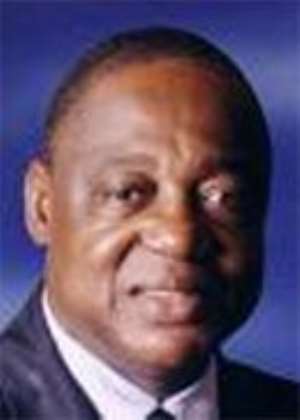
The minister of the Interior, Dr Benjamin Kunbuor, has waded into the issue of Fulani herdsmen menace on the floor of Parliament and called on Ghanaians to be careful not to lump all Fulani citizens together and consider them as criminals.
He said it would be better for us to identify cattle herdsmen who were criminals and deal with them rather than consider all cattle herdsmen as Fulani who were perpetuating crimes since some of the Fulanis in the country were industrialists while others were engaged in other useful ventures.
Dr Kunbuor was reacting to a contribution on the floor of the House by the Member of Parliament (MP) for Nkoranza North, Major Derek Oduro (retd) to the effect that the security apparatus were protecting foreigners who were perpetrating crimes at Agogo instead of protecting Ghanaians.
Dr Kunbuor said investigations carried out had concluded that only 0.3 per cent of all cattle in the Agogo area belong to Fulani herdsmen while they were taking care of a number of cattle for Ghanaians.
Contributing to the debate later, the minister touched on capital gain tax and it was gratifying that the government had identified that phenomenon and put in measures to tax the mining companies as a major source of revenue for the country.
That, according to him, would make the mining companies good corporate citizens and called on Ghanaians to laud such a policy in the 2012 Budget.
When he took his turn in the debate, a former Deputy Minister of Finance and Economic Planning and MP for Wenchi, Professor George Gyang-Baffour stated that the economy, under the present regime, was suffering from Kwashiorkor.
He explained that the Finance Minister stated in the budget that in 2011, the economy grew by 13 per cent, adding that in doing so he “cleverly or in an attempt to obfuscate the situation, did not tell us that half of this growth was from oil production. So if you remove oil production from the 13.6 per cent growth rate, the economy grew only about 6.8 per cent”.
Prof Gyang-Baffour said what the finance minister failed to tell Ghanaians were that non-oil economy, which we had before the oil discovery grew at only 6.8 per cent by the government’s own admission or shrank to 6.5 per cent as per estimates of the International Monetary Fund (IMF).
He said under the NPP, the non-oil GDP, which was now shrinking grew progressively from 3.7 per cent in 2000 to 4.2 in 2001, 4.5 in 2002, 5.2 in 2003, 5.6 in 2004, 5.9 in 2005, 6.4 in 2006, 6.3 in 2007 and 8.4 in 2008.
Prof Gyang-Baffour explained that under the Mills’ administration, the economy shrank from 8.43 in 2008 to 4.0 in 2009, rose to 7.7 in 2010 and shrank again to 6.8 in 2011.
“Madam Speaker, when the economy was injected with the oil, the belly bloated to 13.6 per cent in 2011 as the non-oil economy, representing the buttocks, caved in to 6.8 and the legs, representing the sectors and sub-sectors of the Kwashiorkor economy, shrank and wobbled”, he said.
He expressed the hope that that phenomenon would not re-occur in 2012 otherwise the managers of the economy would have thrusted the country on a slippery and dangerous path of the dreaded Dutch-disease syndrome, which he explained as a condition where countries that find oil neglect the traditional sectors that generate jobs in favour of oil sector and thus destroy their
economies.
For his part, the MP for Asikuma-Odoben-Brakwa, Mr Paul Collins Appiah-Ofori called for the rejection of the budget since the way it had been prepared gave opportunity for people to defraud the state.
He explained that instead of doing specific budgeting, the budget was prepared using incremental budgeting processing.
Mr Appiah-Ofori said that situation did not allow for ghost workers to be smoked out but instead, a percentage was always put on the already corrupt wage bill for corrupt officials to continue to feed on the state.
The Chairman of the Education Committee of Parliament and MP for Nadowli East, Mr Mathias Puozaa commended the government for its policy to eliminate schools under trees and adopt other measures to enable the country to meet the Millennium Development Goals under the education sector.




 Cedi fall: “Myopic” Akufo-Addo govt spending recklessly – Dr. Ato Forson
Cedi fall: “Myopic” Akufo-Addo govt spending recklessly – Dr. Ato Forson
 “Go back to site and complete projects” – Asenso-Boakye to road contractors
“Go back to site and complete projects” – Asenso-Boakye to road contractors
 Stop excessive spending; order appointees to release dollars stashed in their ho...
Stop excessive spending; order appointees to release dollars stashed in their ho...
 Ghanaian Elvis Justice Bedi wins Best African Forex Trader Europe award, promote...
Ghanaian Elvis Justice Bedi wins Best African Forex Trader Europe award, promote...
 May 16: Cedi sells at GHS14.59 to $1, GHS13.74 on BoG interbank
May 16: Cedi sells at GHS14.59 to $1, GHS13.74 on BoG interbank
 Sammy Gyamfi exposes “Bawumia’s family tree in corrupt NPP government”
Sammy Gyamfi exposes “Bawumia’s family tree in corrupt NPP government”
 e-Cedi will enhance Ghana’s dynamic payment ecosystem – BoG
e-Cedi will enhance Ghana’s dynamic payment ecosystem – BoG
 We’re suffering, dying due to 10 months delay in stipend payments — Ghanaian stu...
We’re suffering, dying due to 10 months delay in stipend payments — Ghanaian stu...
 Mahama's promise to use AI-powered plan to combat galamsey a vote-seeking gimmic...
Mahama's promise to use AI-powered plan to combat galamsey a vote-seeking gimmic...
 Don’t be TikTok ‘tokes’ – Archbishop Palmer-Buckle to youth
Don’t be TikTok ‘tokes’ – Archbishop Palmer-Buckle to youth
